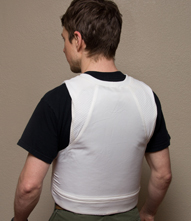Some tips for security personnel from the supplier Safeguard.
Working in the security industry presents various challenges, from high-risk threats for bodyguards, to following suspected shoplifters through a shopping centre for retail-based guards. Depending on the environment and capacity you work within, you might find you face multiple threats from varying sources: door supervisors can often expect to encounter aggressive behaviour from disgruntled, intoxicated people trying to get into a bar or club; those working in event security may find overzealous fans trying to rush onto stage or becoming involved in skirmishes with fellow concert-goers; those providing security at corporate functions, attended by VIPS, may need to watch out for potential troublemakers looking to gain unauthorised entry.
As we start another year, many of us look to make changes to our lives over the coming months, whether to our personal circumstances or our careers. As a security guard, you might want to improve your performance and improve your personal safety on the job – and we’ve put together some of our top tips to help.
Check armour
If you wear body armour in your role, you need to keep on top of its quality to ensure you stay as safe as possible: wearing a vest – whether bullet-proof or stab-proof – is only effective if the protective materials are intact. Holes, rips, tears are all huge problems, as bullets and blades may still be able to penetrate. Check your armour thoroughly and regularly to make sure it’s in good shape.
You also need to make sure your armour’s always a comfortable fit, as if it’s too big or too small, it may still leave you exposed to danger: if you wear an over-sized vest, then it may gape away from the body, leaving enough space for a bullet or blade to pass between; if it’s too small, then it may feel too tight and restrictive. If you’ve gained or lost weight, then make sure you get a vest that offers a better fit. Before ordering new armour, remember to measure yourself in the clothes you normally wear, and consider whether the vest will need to fit over or under your clothing.
Try accessories
If you face risks at a high-level – gunfire, blades – in your security work, you may benefit from wearing additional armour as well as your vest. For those of you working as bodyguards, you’ll probably have to wear your vest underneath civilian clothing, and so accessories may not be appropriate; however, if you work as a security guard in a high-crime area, or on a cargo vessel, or perhaps even in an armoured truck, then wearing additional protection can prove hugely advantageous.
Accessories include shoulder protectors (which can attach to some vests), anti-slash gloves which can protect the hands from attack when trying to disarm a knife-wielding attacker, and helmets (to protect against low-velocity rounds and blunt-trauma strikes, ideal for those working in armoured trucks). You may also need accessories if you feel the level of danger you’re likely to encounter has escalated, or may.
Stay in best condition
There are times in most security roles when you’ll need to be physically active: you may have to run, to give chase, to defend yourself against physical assault, and patrol for hours on end. Being in the best physical condition you can be is a huge help, helping you to perform at the best of abilities and reducing the risks of staining yourself. Try to stay in shape however you can: join a gym, start jogging, take up a sport, whatever you can to get started.
Depending on the level of risks you’re likely to face in your role, being in shape may also help you handle weaponry, and carry heavier armour for long periods: working security on a cargo vessel, for example, you may need to engage in gunfights with pirates, and actively seek cover – being fit and healthy will help you to move fast and hold specific positions for minutes at a time.
Learn skills
As a security professional, you can benefit from having various skills: first-aid, risk assessment, self-defence – all of these, and more, may help you boost your performance and personal safety. First aid can, of course, help you to treat injuries and potentially save lives – again, if you work in an environment and position where gunfire or blades are a viable risk, serious injuries may occur. Knowing how to treat them will be a huge help, and can make you more of an appealing candidate for future roles. Risk assessment knowledge will help you understand potential risks better, and plan ahead for ways to avoid them, while self-defence skills can help you fend off attackers, and may also help you to stay in shape.
Visit: http://www.safeguardarmour.co.uk.










